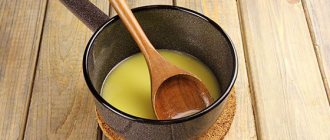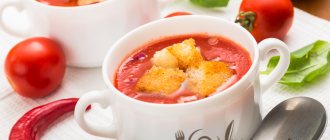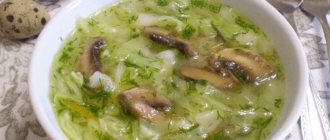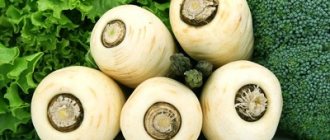Jerusalem artichoke root has a low energy value, but is rich in vitamins, amino acids, minerals and inulin, a substance that has an effect similar to insulin. This makes it an indispensable product for dietary nutrition, especially if the need to follow a diet is associated with type 1 or type 2 diabetes. However, few people include this valuable product in their home menu. This is due to the fact that tuberous sunflower, as the earthen pear is correctly called, is not considered an agricultural crop and is not used in traditional cooking. Many housewives have no idea what dishes can be prepared from Jerusalem artichoke. We decided to fill this gap by presenting 12 recipes for salads, soups, side dishes, main courses and desserts from the Jerusalem artichoke, sharing the secrets of preparing it at home.
Cooking features
Externally, Jerusalem artichoke resembles ginger or celery root and is used raw in much the same way. Also, its tubers are often compared to a pear, as they have a sweetish taste and a pear-like consistency. When preparing main courses or side dishes, Jerusalem artichoke is often replaced with potatoes. Dried and crushed tubers are used instead of starch or flour, this allows you to make healthy baked goods.
Raw Jerusalem artichoke tastes like a cabbage stalk with nutty notes. Some consider it similar to asparagus and artichoke. Roasted earthen pear resembles frozen potatoes, but has mushroom notes.
Knowing the properties of Jerusalem artichoke, it’s easy to come up with recipes for appetizers and soups made from it by analogy with familiar products. Regardless of whether you invent your own version of a dish made from earthen pears or intend to use a ready-made solution that you found in our selection, knowledge of several features of preparing Jerusalem artichoke will be useful to you.
- The first question that a housewife who wants to cook an earthen pear will have to do with the time of cooking, stewing, and baking Jerusalem artichoke. The answer is simple: Jerusalem artichoke takes the same amount of time to cook as potatoes, or even a little faster.
- The second question that inexperienced cooks often ask is related to the need to heat treat the earthen pear. Is it necessary? Will this reduce the benefits of the vegetable? During heat treatment, most of the beneficial properties of Jerusalem artichoke are preserved, but not all: for example, there will be almost no vitamin C left in it after boiling or baking. You can eat Jerusalem artichoke raw, but in limited quantities, since excessive consumption of raw earthen pear can cause bloating. It is not advisable to offer raw Jerusalem artichoke salads to children under 5 years of age. There are no other contraindications to eating earthen pears without heat treatment.
- The third question that can confuse a novice cook is related to cold processing of the product: is it necessary to peel the Jerusalem artichoke? It is believed that if the tubers are thoroughly washed, there is no need to peel them, especially since this is not the most pleasant task. However, this can only be done if you grew the earthen pear yourself without adding excessive amounts of fertilizer - tuberous sunflower quickly absorbs various substances, including nitrates. If you are not confident in the environmental safety of the product, it is better not to be lazy and clean it.
The main points that you need to know when preparing Jerusalem artichoke dishes at home are now no longer a secret to you. You can move on to the recipes. If you follow a diabetic menu, choose dishes that do not contain foods high in fast carbohydrates or in which they are present in minimal quantities.
Jerusalem artichoke dishes
How to make Jerusalem artichoke powder at home
Jerusalem artichoke removed from the ground is very poorly stored. Therefore, when grown on an industrial scale, the optimal way to store it is thermal (or cryogenic) drying and subsequent processing into powder in ball mills.
Before drying, the Jerusalem artichoke is thoroughly washed and crushed into chips. The thermal method involves long-term exposure of raw materials to high temperatures (up to +50 C). During cryogenic processing, Jerusalem artichoke chips are dehydrated using low temperatures. At the same time, the raw materials are enriched with biologically active elements. So in cryopowder the concentration of minerals increases significantly. In addition, such flour can be stored for a long time without losing its beneficial properties.
At home, you can prepare Jerusalem artichoke powder using the same technological scheme. Remove the tubers from the ground, wash with a stiff brush and dry. Cut into very thin slices, dry in an electric dryer, oven, or any other way. Then grind in a coffee grinder until it becomes powdery. The benefits of homemade Jerusalem artichoke powder are much greater than those of its industrial counterpart.
Jerusalem artichoke soup with brown or wild rice
- Jerusalem artichoke – 0.2 kg;
- brown rice – 100 g;
- carrots – 100 g;
- shallots – 100 g;
- cream – 100 ml;
- water – 1 l.
- Wash the rice.
- Peel and cut the Jerusalem artichoke into centimeter cubes.
- Cut the carrots into small cubes.
- Cut the onion into small pieces.
- Boil the rice.
- Place the vegetables in a saucepan, cover with water, and boil until soft.
- Grind with a blender.
- Add salt to taste, add cream and rice, stir.
- Bring to a boil and cook for a couple of minutes.
Another version of this recipe involves frying onions and carrots in a mixture of butter and vegetable oils. This will make the soup tastier, but less healthy. Which option to choose is up to you.
Jerusalem artichoke jam
Jerusalem artichoke jam requires a minimum of sugar
You will need:
- 1 kg of earthen pear tubers
- 500 g plums
- 100 g sugar
- 5 g (1 teaspoon) citric acid
- 100 ml water
How to cook
- Wash the plums and remove the seeds, wash the Jerusalem artichoke with a brush, and cut into thin slices.
- Place the ingredients in a bowl, add water and sugar, bring to a boil over low heat, stirring frequently.
- Boil for 1 hour under the lid, stirring with a spatula from time to time.
- Let the jam cool slightly and rub through a sieve, separating the plum skins.
- Cook the ground jam over low heat for another 10 minutes, adding citric acid.
- Place in sterilized jars and seal with lids.
Cabbage soup “Fisherman” with fish and Jerusalem artichoke
- nettle – 0.2 kg;
- sorrel – 0.2 kg;
- Jerusalem artichoke – 0.2 kg;
- fish fillet – 0.3-0.4 kg;
- bay leaf, allspice, salt - to taste;
- green onions – 50 g;
- water or broth - 1.5 l.
- Pour boiling water over the nettles and chop.
- Wash and cut the sorrel.
- Cut the Jerusalem artichoke into small cubes.
- Cut the fish into fillets. Cut into small pieces.
- Boil water or broth, put Jerusalem artichoke in it.
- After 5 minutes, add the fish.
- After 10 minutes, add nettle and sorrel, salt and spices.
- After 5-10 minutes, the soup can be removed from the heat.
Serve fishermen's cabbage soup from Jerusalem artichoke preferably with sour cream. Green onions are placed directly into plates or together with greens. Nettles or sorrel in this recipe can be replaced with spinach, fresh or frozen. This delicious and unusual soup can be prepared even during fasting. The dish is suitable for diabetic nutrition.
Ground pear soups
How to take Jerusalem artichoke powder
Jerusalem artichoke powder is used as a useful remedy in the fight against dysbiosis, primarily in children and the elderly. To restore normal intestinal microflora per day, it is enough to eat one tablespoon of powder, using it as a food additive. One tablespoon of powder (7.5 g) contains up to 6 million bifidobacteria, as well as dietary fiber (1 g), sodium (6 mg), carbohydrates (6 g).
For both types of diabetes, 1-2 teaspoons should be taken with meals. This will reduce the GI of food entering the body, and will also reduce the likelihood of developing atherosclerosis.
Steam 1-2 tablespoons of Jerusalem artichoke powder with 0.5 liters of boiling water. Drink a cup 2-3 times a day on an empty stomach during exacerbation of chronic diseases or weakened immunity.
Take 1 tablespoon each of Jerusalem artichoke powder and licorice rhizomes. Boil the mixture in 0.5 liters of silicon water for half an hour. Drink 150 ml of the strained solution before meals.
For mild allergies, a decoction (jelly) prepared from silicon water and Jerusalem artichoke flour is beneficial. During the day you need to drink up to 2 cups of the drink. The same remedy, if you add honey to it, will help with arteriosclerosis. Take it the same way.
For allergies, treatment according to the following scheme helps. Infuse a tablespoon of powder per cup of boiling silicon water in a thermos for 5 hours. Take 1.5 tablespoons up to 7 times a day on an empty stomach. Duration of treatment is 2-3 weeks. After the same break you can repeat.
During the recovery period after a stroke or heart attack, it is good to use this very useful remedy. Soak 3 tablespoons of powder in a cup of silicon water in the evening (at 16:00). Add finely chopped walnuts (3 pieces) and a tablespoon of raisins to the swollen pulp. In the morning at 8 o'clock, eat the dish on an empty stomach. The duration of the course is at least 2-3 months.
For insomnia, porridge made from Jerusalem artichoke powder is beneficial. Eat it up to 5 times a day, 50 g each.
Bring 1.5 liters of silicon water to a boil. At this moment, add 0.4 kg of Jerusalem artichoke powder and mix. Add honey and drink hot for bronchitis and loss of voice.
For hyperacid gastritis, you can prepare a useful remedy. Pour 100 g of Jerusalem artichoke flour into 1 liter of boiled silicon water. Simmer slowly over heat for about an hour. Add to the cooled mixture:
- honey - 2 tbsp. l.;
- ground nuts (walnuts) – 2 tbsp. l.;
- fennel leaves - 1 tbsp. l.;
- salt – 1 tsp.
Divide the resulting mixture into 3 servings. Eat before the main meal. Duration of treatment is a week.
For diabetes, dissolve 1-2 tablespoons of powder in 0.5 liters of hot infusion (on cranberry leaves), filter and drink before meals several times a day.
Jerusalem artichoke puree for garnish
- Jerusalem artichoke – 0.5 kg;
- olive oil – 5 ml;
- cream – 50 ml;
- salt, spices - to taste.
- Wash and clean the Jerusalem artichoke.
- Without cutting, fill with cold water and place on the stove.
- Cook for 20 minutes after the liquid boils.
- Drain in a colander. Place in a saucepan.
- Add cream.
- Puree using a masher or a special mixer attachment.
- Salt, add oil and spices. Mix thoroughly.
Jerusalem artichoke puree is suitable as a side dish for meat and fish dishes, and can completely replace mashed potatoes.
Fried Jerusalem artichoke on the side
- Jerusalem artichoke – 0.5 kg;
- lemon – 1 pc.;
- salt, pepper, fresh herbs - to taste;
- vegetable oil - how much will be needed.
- Wash the Jerusalem artichoke and cut into slices.
- Squeeze the juice out of the lemon and mix with half a liter of water.
- Place Jerusalem artichoke in a bowl with the solution and marinate it for 15 minutes.
- Rinse and dry with a napkin.
- Heat vegetable oil suitable for frying in a frying pan.
- Place Jerusalem artichoke in it. Fry it for 3-4 minutes, stirring occasionally, over medium heat.
- Add salt, pepper, and fry for another 1-2 minutes.
- Cover with a lid. Put out the fire.
Harvesting Jerusalem artichoke
Jerusalem artichoke saves us from many diseases, and at the same time provides the opportunity to enjoy delicious and healthy dishes created on its basis. Collecting and preparing Jerusalem artichoke is a rather labor-intensive process, but all the labor costs pay off with interest.
From North America, Jerusalem artichoke first came to France - the navigator Samuel Champlain contributed to the spread of useful tubers. Already in the eighteenth century, the plant appeared in Russia - the history of its cultivation in our region is not stable (interest in this crop either increases or subsides).
Harvest and storage
The Jerusalem artichoke harvest is harvested not only in autumn, but also in spring. This crop is interesting because the tubers can overwinter under the snow without losing their beneficial properties and taste (thus, it makes no sense to harvest the entire crop at once). In order to protect useful tubers as much as possible during wintering, the beds are covered with any mulching material (thanks to this, Jerusalem artichoke can withstand frosts down to -40°C). It has been noticed that thawing and freezing again, Jerusalem artichoke remains quite edible.
During the spring harvest, the location of the tubers is determined by the stumps remaining from the cut plants. In autumn, the harvest is harvested in October-November. Until this time, the aerial part under the root is not cut off (be sure to leave 15-17 cm), since the outflow of nutrients is still ongoing. If you do not follow this recommendation, the plant productivity drops noticeably. Store the harvested crop in the lower compartment of the refrigerator, wrapped in a damp cloth (tubers quickly lose moisture). The duration of such storage does not exceed two weeks.
Jerusalem artichoke salad for the winter
- Jerusalem artichoke – 1 kg
- Carrots – 500 g
- Lemon – 1 pc.
- Salt
Jerusalem artichoke tubers, as well as carrots, are peeled, washed, chopped into strips and mixed with grated lemon (both peel and pulp are used). The mixture is salted, stirred and allowed to stand until the juice appears. The salad is transferred to clean jars and pasteurized (1 and 0.5 l - 20 and 15 minutes, respectively).
Jerusalem artichoke, canned in sea buckthorn juice
- Jerusalem artichoke – 1 kg
- Sugar - 200 g
- Sea buckthorn juice – 200 ml
- Water – 400 ml
Jerusalem artichoke is washed, peeled, cut into slices, poured with a mixture of sea buckthorn juice and water, sugar is added and brought to a boil over medium heat. After this, the product (along with the juice) is transferred into steamed jars, covered with lids and pasteurized (1 and 0.5 l - 15 and 10 minutes, respectively).
Pickled Jerusalem artichoke
- Jerusalem artichoke
- Carrot
- Natural honey – 2 tbsp.
- Water – 1 l
- Apple cider vinegar – 50 ml
- Salt – 50 g
Jerusalem artichoke and carrots are washed, peeled, cut into pieces, mixed and placed in sterilized jars. The product is poured with boiling marinade, pasteurized (1 and 0.5 l - 20 and 15 minutes, respectively) and closed.
Spicy canned Jerusalem artichoke
- Jerusalem artichoke
- Hot pepper
- Water – 1 l
- Dill and currant leaves
- Vinegar – 50 ml
- Black peppercorns
- Salt – 50 g
- Sugar – 100 g
The prepared Jerusalem artichoke is placed in sterilized jars, seasonings are added to each of them and poured with boiling marinade. The jars are pasteurized (1 liter - 20 minutes) and sealed.
Dried Jerusalem artichoke
The tubers, washed with a brush, are cut into thin slices and dried in the shade under a canopy or in the oven (optimum temperature: 70°C). The resulting dry slices are consumed as chips or crushed and used in the preparation of various dishes or drinks.
An increasing number of gardeners are growing Jerusalem artichoke in our country - this is explained by the mass of valuable properties inherent in this tuberous plant.
© When copying site materials, keep an active link to the source.
Jerusalem artichoke stew with beans and mushrooms
- boiled or canned white beans – 0.25 kg;
- Jerusalem artichoke – 0.3 kg;
- fresh mushrooms (porcini or champignons) – 0.2 kg;
- carrots – 100 g;
- onion – 75 g;
- sweet pepper – 0.4 kg;
- chili pepper – 1 pod;
- garlic – 2-3 cloves;
- tomatoes – 0.2 pcs.;
- oil - how much will it take;
- fresh herbs, salt - to taste.
- Peel the sweet pepper from seeds, cut into squares or strips.
- Grate the carrots.
- Cut the onion into small cubes.
- Cut the mushrooms into plates or bars.
- Remove the seeds from the hot pepper by finely chopping the pulp.
- Also finely chop the garlic and herbs.
- After dousing the tomatoes with boiling water, peel and cut into small cubes.
- Cut the Jerusalem artichoke into medium-sized cubes.
- Heat the oil in a non-stick pan or casserole dish.
- Fry mushrooms in it.
- When excess moisture has evaporated, add onions, carrots and Jerusalem artichokes. Fry for 10 minutes.
- Add tomatoes and peppers (both sweet and bitter), after 5 minutes add the remaining ingredients. If using canned beans, pour them into the pan along with the juice from the can. When using beans that you cooked yourself, add a ladle of the broth from underneath them.
- Simmer the vegetables over low heat for 10-15 minutes. A few minutes before readiness, add chopped garlic and herbs.
When preparing stew, you can do without frying. In this case, all the ingredients are combined and simmered for half an hour. In a multicooker to prepare Jerusalem artichoke stew, it is advisable to use the “Stew” program or a similar one. Stew can be served as a side dish or as a main course. The recipe is suitable for fasting and vegetarians. People on a diet, including diabetics, should also like it.
Second courses of Jerusalem artichoke
Vegetable salad with Jerusalem artichoke
For vegetable stew made from Jerusalem artichoke, you can choose any ingredients. Try adding zucchini, eggplant, canned beans, chili pepper. Anything you like or whatever you have in the fridge.
You will need:
- 300 gr. – Jerusalem artichoke
- 200 gr. – fresh champignon mushrooms
- 1-2 pcs. – carrots
- 1-2 pcs. – bell pepper
- 3-4 pcs. – garlic cloves
- 2-3 pcs. - tomato
- 1 PC. - onion head
- Oil, fresh herbs, salt, spices - to your taste
1. Wash the bell pepper, remove seeds and membranes, and cut into thin strips.
2. Wash the carrots, peel and grate on a coarse grater or a Korean carrot grater.
3. Peel the onion and cut into half rings.
4. Cut the mushrooms into thin slices.
5. Scald the tomatoes with boiling water, remove the skin and cut into cubes.
6. Finely chop the garlic cloves and herbs.
7. Wash the Jerusalem artichoke, peel the skin and cut into cubes or slices.
8. In a large frying pan, fry onions and mushrooms in vegetable oil.
9. Then add all the prepared vegetables and simmer over low heat for 30 minutes.
10. 5 minutes before readiness, add garlic and herbs.
11. The stew is ready. You can set the table.
Bon appetit!
Draniki from Jerusalem artichoke
- Jerusalem artichoke – 0.4 kg;
- carrots – 1 pc.;
- chicken egg – 1 pc.4
- wheat flour – 4 tbsp. l.;
- salt - to taste;
- vegetable oil - how much will be needed.
- Grind the peeled Jerusalem artichoke on a grater.
- Finely grate the carrots.
- Mix vegetables.
- Beat in the egg and mix.
- Add salt to taste.
- Add the sifted flour and stir again.
- Heat the oil.
- Spoon the vegetable mixture into the boiling oil, forming pancakes.
- Fry the pancakes on both sides until golden brown.
Jerusalem artichoke pancakes resemble potato pancakes. Like traditional pancakes, they can be made with minced meat filling. The dish is served with sour cream. You can’t call it dietary, but your household, especially children, will certainly appreciate the taste of this dish (which, by the way, still has many beneficial properties).
Jerusalem artichoke casserole
- Jerusalem artichoke – 0.5 kg;
- milk – 50 ml;
- chicken egg – 2 pcs.;
- cheese – 100 g;
- vegetable oil - for lubricating the mold.
- Grind the Jerusalem artichoke and cheese separately on a grater.
- Beat eggs with milk and salt.
- Add half the cheese to the egg mixture.
- Combine the resulting mixture with chopped tubers.
- Place in a greased pan.
- Bake at 180 degrees for 25-30 minutes. 10 minutes before cooking, sprinkle with remaining cheese.
The casserole can be made without cheese, but then it will turn out less filling and not as tasty. We still advise you not to exclude cheese from the recipe.
Jerusalem artichoke drinks
With apples
. Wash the Jerusalem artichoke and apples, squeeze out the juice using a juicer, and drink immediately.
With pumpkin
. Wash the Jerusalem artichoke, pour over boiling water, peel the pumpkin, squeeze out the juice from both ingredients, add lemon juice.
Compote decoction
. 3 tbsp. l. Dried tuber slices pour 1 liter of water, boil, leave for at least 30 minutes and drink.
coffee drink
. 2 tsp. dried Jerusalem artichoke powder pour 300 ml of boiled water (temperature 80-90 degrees) and drink like coffee. Add sugar and milk to taste.
For diabetics, consume without sugar.
Jerusalem artichoke kvass
. Pour boiled water over the chopped tubers and place in a warm place. After 3 days the drink is ready for consumption.
Jerusalem artichoke wine
. 5 kg of Jerusalem artichoke tubers minced through a meat grinder are mixed with 5 kg of sugar. Add 0.5 kg of raisins and 300 g of rice. Pour in 20 liters of boiled water. The resulting mixture in a flask or bottles is placed in a warm place for fermentation. After the mass settles to the bottom, the liquid is filtered through a sieve and several layers of gauze.
The resulting solution can be tinted with dried Jerusalem artichoke to a cognac color or with any fruit and berry syrup. Pour the solution into glass bottles, tightly capped. The strength of the wine will depend on the aging time.
Herbal tea
. 2 tbsp. l. Dried tuber slices pour 300 ml of water, boil and leave for at least 30 minutes. Can be combined with regular tea and other herbs.
Vegetable maseduan
- Jerusalem artichoke, cauliflower, asparagus, artichokes, turnips, potatoes, green beans - 100 g each;
- cream – 0.2 l;
- nutmeg - on the tip of a knife;
- salt, breadcrumbs - to taste.
- Boil the vegetables in salted water until tender, individually or together.
- Mix cream with nutmeg.
- Add breadcrumbs to vegetables and stir. Place in the mold.
- Pour in the cream and place in an oven preheated to 180 degrees for 15-20 minutes.
This delicious dish is unlikely to leave you indifferent. The vegetable composition of the dish can be adjusted at your discretion, but the given recipe allows you to get the most harmonious taste.
Jerusalem artichoke salads
Salad “From 100 ailments”
- Jerusalem artichoke – 0.2 kg;
- apple – 0.2 kg;
- carrots – 100 g;
- lemon – half a fruit;
- walnut kernels - half a glass;
- vegetable oil - to taste;
- sugar or honey (optional) – 5 g.
- Peel the Jerusalem artichoke, carrots and apples and chop them on a coarse grater.
- Mix the juice and zest of half a lemon with vegetable oil. If you are preparing a salad for dessert, add melted honey or sugar.
- Crush the nuts by hand or using a blender.
- Mix all ingredients in a salad bowl and serve.
The salad fully lives up to its name. Perhaps there won’t be 100 diseases that it helps to resist, but it will definitely overcome several dozen ailments.
Jerusalem artichoke salad “Treasure of Jerusalem”
- Jerusalem artichoke – 0.25 kg;
- garlic – 2-3 cloves;
- pomegranate seeds, lettuce leaves or greens - for decoration;
- sour cream or mayonnaise - for dressing.
- Grate the peeled earthen pear.
- Crush the garlic with a special press.
- Combine the garlic mass with Jerusalem artichoke puree, season with sour cream or mayonnaise.
- Place greens at the bottom of bowls or portioned salad bowls.
- Lay out the salad.
- Sprinkle with pomegranate seeds.
This earthen pear salad is almost as healthy as the previous one. It’s even easier to prepare and looks even more appetizing.
If you don’t yet know how to separate pomegranate seeds so as not to crush them and not get dirty with pomegranate juice, we recommend that you read the article on this topic (there is also a video that will certainly help you).
Tartlets with Jerusalem artichoke salad for a buffet table
- Jerusalem artichoke – 0.5 kg;
- canned corn – 130 g;
- chicken egg – 0.5 dozen;
- salt, spices - to taste;
- sour cream or mayonnaise - to taste;
- tartlets - how much salad is enough for.
- Boil Jerusalem artichoke and eggs.
- Cool and peel the food, cut into small cubes.
- Mix with corn.
- Add salt, season, add just a little sour cream, stir.
Divide the salad among tartlets and serve. They look beautiful, and your guests will never guess what the filling is made of, although they will almost certainly be won over by the taste.
You will learn what else you can fill tartlets with and how to bake them yourself from the materials “Tartlets for the festive table” and “Fillings for tartlets: 12 recipes for different budgets.”
Jerusalem artichoke soufflé
- Jerusalem artichoke – 0.5 kg;
- cheese – 150 g;
- cream – 100 ml;
- egg whites – from 2 eggs;
- butter – 40 g;
- salt or sugar (optional) - to taste.
- Coarsely grate the Jerusalem artichoke, fry in butter until soft, rub through a sieve or grind in a blender.
- Whisk the cream and egg whites separately.
- Finely grate the cheese.
- Mix the cheese with the Jerusalem artichoke, then add the cream, then the whites, stirring the mixture each time until smooth.
- Place in the pan and bake until golden brown.
Children will go crazy for such a breakfast, and parents will not refuse such a delicate delicacy.
Jerusalem artichoke can be used to prepare not only healthy, but also delicious dishes, many of which are worthy of a festive table. Simple and tasty, they are prepared quickly enough without requiring much culinary skill. This allows you to include earthen pear dishes in the daily menu.
The root vegetable, which has the second name “earthen pear”, is known for its beneficial properties. It contains vitamins B, PP, C, essential amino acids and minerals. Amino acids found in it include arginine, lecithin, and lysine. Jerusalem artichoke has a high content of inulin - natural insulin. Therefore, it is recommended for diabetics to eat it regularly. Potassium and magnesium, phosphorus and chromium, silicon and calcium are the main minerals contained in Jerusalem artichoke.
The abundance of nutrients in the earthen pear makes it indispensable in the diet of people suffering from obesity and metabolic disorders.
The taste of raw Jerusalem artichoke resembles a stalk to some, and nuts to others. Raw tubers are good in salads. But its use is not limited to this. There are many recipes with Jerusalem artichoke, where it is used fried, boiled and stewed, acquiring a new taste reminiscent of mushrooms.
Sauce with Jerusalem artichoke and mushrooms
You can prepare various dishes from Jerusalem artichoke. The sauce recipe that goes perfectly with pasta is as follows.
Prepare the following products:
- Jerusalem artichoke (2 pieces);
- champignons (500 grams);
- cream (500 ml);
- cheese (50 grams);
- butter (50 grams);
- garlic (5 cloves);
- salt;
- pepper.
Melt the butter in a frying pan and fry the garlic in it. Then place the Jerusalem artichoke cut into cubes in a frying pan and lightly fry. Next, add champignons to it and continue cooking. The mushrooms will release a little liquid, which should evaporate almost completely.
When there is practically no liquid left, pour in the cream and bring the contents of the pan to a boil. After this, add the cheese and cook the sauce until thickened.
These are not all delicious dishes made from Jerusalem artichoke. The root vegetable is surprisingly tasty fresh, so you will probably like salads with it too.
Jerusalem artichoke salads
Adding raw Jerusalem artichoke to such famous salads as vinaigrette and Chinese cabbage gives them a piquant taste. It will take the housewife a little time to prepare them, adding variety to the daily diet and health benefits.
Vinaigrette with Jerusalem artichoke
- Jerusalem artichoke tubers - 200 g;
- boiled beets - 200 g;
- boiled cabbage - 200 g;
- canned green peas - 1 can;
- onion - 1 small head;
- vegetable oil - for dressing.
How to prepare the salad:
The washed and peeled tubers are cut into cubes and combined with cubes of boiled beets in equal proportions, then the same amount of sauerkraut is added. In addition to the salad, you can add green peas. The salad is completed with chopped onions and any vegetable oil. All ingredients are mixed and the salad is ready.
Salad of Chinese cabbage and earthen pear
- Jerusalem artichoke - 250 g;
- Chinese cabbage - 150 g;
- corn - 0.5 cans;
- fresh cucumber;
- boiled egg - 2 pcs.
All components are cut (tubers into cubes, cabbage into strips) and mixed. Add corn, chopped boiled eggs, cucumber. Salt, pepper, mayonnaise, and herbs are added to your taste.
Jerusalem artichoke with mushrooms
To prepare the salad you will need the following products:
- Jerusalem artichoke - 300 g;
- mushrooms - 200 g;
- corn - 100 g;
- eggs - 3 pcs.
The washed Jerusalem artichoke is boiled for five minutes. Diced tubers are combined with chopped boiled eggs and mushrooms. Then add corn, ground pepper, salt, herbs and dressing (mayonnaise). Mix everything thoroughly and the salad is ready.
Jerusalem artichoke marinated with tomatoes
Jerusalem artichoke - 1 kg water - 150 ml onion - 1 pc. garlic - 2 cloves parsley - 1 bunch olive oil - 4 tbsp. l. tomatoes (small) - 250g citric acid.
Peel the Jerusalem artichoke, wash, cut into cubes, and place in cold water with lemon juice. Bring the water to a boil, put the peeled Jerusalem artichoke into it, and cook for about 10 minutes until tender.
Grind one onion, 2 cloves of garlic, 1 bunch of parsley, mix with boiled Jerusalem artichoke, season with olive oil. Garnish the salad with small tomatoes.
Jerusalem artichoke “spicy” For 1 jar: Jerusalem artichoke, 1 pod of red hot pepper, 10 pieces of black peppercorns, dill, a sprig of black currant with leaves. For the marinade: 1 liter of water, 100 g of sugar, 50 g of apple cider vinegar, 50 g of salt.
Place the washed and peeled Jerusalem artichoke in a jar, add a pod of red pepper, an umbrella of dill, black peppercorns, and a sprig of currants.
Prepare the marinade, pour it over the assortment and sterilize in boiling water. Roll up immediately.
Second courses of Jerusalem artichoke
Many will be surprised to learn that these root vegetables make delicious, unusual pancakes, pancakes, and casseroles. Jerusalem artichoke goes well in such dishes with carrots, pumpkin, and zucchini. We'll tell you how to make pancakes from zucchini and pear tubers. If desired, zucchini can be replaced with pumpkin and carrots.
Jerusalem artichoke and zucchini pancakes
- Jerusalem artichoke - 500 g;
- zucchini - 500 g;
- chicken eggs - 4 pcs.;
- flour - 1 glass;
- salt to taste.
Take equal proportions of zucchini and Jerusalem artichoke tubers (about 0.5 kg), wash and peel. Young zucchini and tubers do not need to be peeled, just cut off the ends. Then grate the vegetables on a grater, preferably with large meshes. Add four eggs, a glass of flour, and salt to taste to the crushed mass. Spoon the resulting liquid mass into a frying pan and fry on both sides.
Pepper with rice and Jerusalem artichoke
- rice - 1 glass;
- carrots - 1 pc.;
- Jerusalem artichoke tubers - about.5 kg;
- onion - half a head;
- garlic - 5 cloves;
- salt and pepper - to taste;
- bell pepper - 10 pcs.;
- sour cream - for filling.
The taste of pepper stuffed with Jerusalem artichoke and rice is original.
A glass of washed rice is lightly boiled. Grated carrots and sauteed in vegetable oil, and lightly fried onions are added to it. A pound of Jerusalem artichoke tubers is grated and added to the rice. To the total mass add 5-6 cloves of garlic, pressed through garlic, salt, ground black pepper. Ten sweet peppers are doused with boiling water, seeded and stuffed with the finished mixture. Stuffed peppers are placed in a saucepan, poured with sour cream and stewed in the oven.
The next recipe that we would like to offer you has not been tried by many people - it is an earthen pear baked with mushrooms.
What dishes can be prepared from Jerusalem artichoke
The range of culinary delights is very wide. Ground pear is consumed fried, boiled, baked, raw, and made into juice, coffee, kvass, puree, and cold snacks. You can even make desserts: jelly, jam, marmalade. It is recommended to consume 50-70 g of tubers per day. It can be in any form, but raw vegetables are considered the healthiest for diabetics.
Sandwiches "Toluca"
Raw Jerusalem artichoke (2-3 large tubers) and onions (1 piece) are finely chopped and mixed. The loaf is cut into sandwich pieces, spread with butter (4 g) and the vegetable mixture is spread on them. You can add salt on top for taste. Allow the tolukas to soak for 10-15 minutes and serve. The specified amount of products makes six sandwiches.
Sandwich paste
This is another way to quickly and deliciously prepare a snack dish of Jerusalem artichoke for diabetics. One head of garlic is crushed, finely grated earthen pear and cheese (100 g each) are added. Fish (100 g) is chopped with parsley and dill (20 g). Mix all ingredients, add sour cream or mayonnaise (5 tablespoons), salt and pepper to taste.
Spring salad
This is a recipe for one of the simplest Jerusalem artichoke dishes. Raw vegetable (200 g) is cut into thin strips or grated on a coarse grater. Sorrel leaves (200 g) are doused with salted boiling water and cut. One clove of garlic is crushed and added to the total mass.
For the dressing, mix ½ cup of boiled water, 2 tablespoons of vinegar (6% or 9%), 3 tablespoons of unrefined vegetable oil, sugar and salt (½ teaspoon each). Whip the prepared liquid and, without settling, pour it over the vegetable salad.
Combined salad
It is made from equal quantities of raw Jerusalem artichoke, carrots, fresh cabbage, celery and herbs. Add three times less raw beets. All components are grated on a coarse grater and seasoned with olive or sunflower oil. This dish helps with diabetes and controls blood sugar and improves bile secretion. After all, there are not only beneficial herbs for the liver, but also vegetables. And this dish has them.
Young nettle leaves (200 g) are blanched for about 3 minutes in hot salted water and chopped. Add the same amount of chopped sorrel to the nettle. Jerusalem artichoke (200 g) cut into strips. All prepared ingredients are placed in a pan, poured with boiling water, salted and cooked until tender. At this time, onions (100 g) are cut into half rings and sautéed in vegetable oil.
Casserole
Jerusalem artichoke (500 g), cut into thin slices, and carrots (100 g), grated on a coarse grater, are fried in a small amount of oil. Then add green peas (100 g) and add salt to taste. Pour the vegetables over the omelette mixture prepared from 3 beaten eggs and 6 tablespoons of milk. Place the future casserole in a greased form and bake in the oven at 180°C for about half an hour.
Diet puree
Its preparation differs little from the recipe for classic mashed potatoes, which is not recommended for frequent consumption by diabetics. You can eat pear puree without fear for your well-being. Tubers (500 g) are boiled in salted water for about 20 minutes. The water is drained and the vegetables are mashed into a puree. Add milk (2 tablespoons) and butter (10 g). Sprinkle with herbs and spices on top.
This intricate name has a fairly simple and tasty dish made from assorted vegetables. You need to take 200 g of different vegetables: Jerusalem artichoke, cauliflower, celery, green beans, artichoke, asparagus, potatoes, zucchini. If a component is not available, you can replace it with any other to your liking.
The recipe includes 800 g of tubers, 200 g of carrots, 100 g of flour, 2 eggs, 150 ml of vegetable oil, salt. Root vegetables are grated on a fine grater, salted, eggs and flour are added. Place the kneaded dough with a spoon onto a frying pan heated with oil and fry on both sides. Pancakes will be even more delicious if you eat them with sour cream.
First you need to cook the syrup from 2 glasses of water and 200 g of sugar. As a last resort, it is recommended to take not the usual one, but the one sold in the departments for diabetics. Juice squeezed from half a lemon and a whole orange is added to the finished syrup.
Jerusalem artichoke is cut into small pieces and boiled in syrup for 5-10 minutes over low heat. If the pieces can be easily pierced with a toothpick, then they are ready. If they are too hard, you need to cook them for a few more minutes. The finished root tubers are taken out with a slotted spoon, and the second portion is boiled in syrup. When all the candied fruits are ready, they should be placed on a baking sheet and dried for two hours in the oven at low temperature (about 50°C). Sugar is ground into powder in a coffee grinder and sprinkled over dried and cooled candied fruits.
Jerusalem artichoke coffee
There are many drinks (beet kvass, chicory, birch sap, etc.) that are useful for diabetics. This recipe is also worth adopting for those who love an unusual taste. Coffee is made from dried tubers. To do this, you don’t have to peel them, but rinse them well and immediately cut them into thin slices.
https://www.youtube.com/watch?v=ytadvertiseru
Then the slices are dried in a low-heat oven or in the open air. It is very useful to make such a preparation for the winter - in this case, you can prepare home remedies for diabetes all year round. The dried chips are crushed in a coffee grinder and prepared from coffee powder in the usual way - in a Turk or coffee maker.
The leaves and inflorescences of this plant are also used to prepare drinks. To make aromatic tea, you need to twist fresh Jerusalem artichoke leaves and mash them with a rolling pin or just with your hands. This starts the fermentation process. In addition to leaves, you can also add inflorescences to the tea leaves. This tea is brewed in the traditional way - by steeping for 15-20 minutes.
If you don’t have Jerusalem artichoke stored for future use in your home bins and you don’t know what to make a medicinal drink from, don’t despair. There are ready-made products, for example, Jerusalem artichoke syrup, which you can always have on hand in the kitchen and add to any dishes instead of regular sugar.
There is another tasty product - Fobrinol drink. It comes in powder form and is very convenient to use. But the main thing is that it contains inulin, B vitamins, amino acids, and a probiotic, which is so necessary for every diabetic. The product does not need to be taken as a medicine - in terms of time and regimen, it is enough to drink it like tea. The result is glucose control and good health.
In conclusion, I would like to note that the above recipes for preparing dishes from Jerusalem artichoke are suitable not only for diabetics, but also for everyone who adheres to proper nutrition and monitors their own health. After all, this valuable vegetable is useful not only for diabetes mellitus types 1 and 2, but also for many other diseases.
Good health to you and bon appetit! Nadezhda Goryunova
Video recipes from Jerusalem artichoke
A quick video recipe for making Jerusalem artichoke from Nadezhda Vykhodtseva:
In the next video you will learn how to prepare a delicious Jerusalem artichoke salad with apples
How and why you should use Jerusalem artichoke, its benefits and harms in the next video lesson
The root vegetable, which has the second name “earthen pear”, is known for its beneficial properties. It contains vitamins B, PP, C, essential amino acids and minerals. Amino acids found in it include arginine, lecithin, and lysine. Jerusalem artichoke has a high content of inulin - natural insulin. Therefore, it is recommended for diabetics to eat it regularly. Potassium and magnesium, phosphorus and chromium, silicon and calcium are the main minerals contained in Jerusalem artichoke.
The abundance of nutrients in the earthen pear makes it indispensable in the diet of people suffering from obesity and metabolic disorders.
The taste of raw Jerusalem artichoke resembles a stalk to some, and nuts to others. Raw tubers are good in salads. But its use is not limited to this. There are many recipes with Jerusalem artichoke, where it is used fried, boiled and stewed, acquiring a new taste reminiscent of mushrooms.
Jerusalem artichoke juice, benefits
Jerusalem artichoke juice
A huge amount of useful substances and inulin (a polysaccharide) - all this is found in Jerusalem artichoke juice. Its benefit also lies in the fact that the juice contains minerals, valuable amino acids, pectin and vitamins of various groups.
In terms of the content of nutrients, vitamins and microelements, Jerusalem artichoke is several times superior to many vegetable crops.
Jerusalem artichoke juice is useful for atherosclerosis, fatty deposits in the liver and for the prevention of cancer. In addition, this drink lowers blood pressure and fights vascular and heart diseases.
Jerusalem artichoke salads
Adding raw Jerusalem artichoke to such famous salads as vinaigrette and Chinese cabbage gives them a piquant taste. It will take the housewife a little time to prepare them, adding variety to the daily diet and health benefits.
Vinaigrette with Jerusalem artichoke
- Jerusalem artichoke tubers - 200 g;
- boiled beets - 200 g;
- boiled cabbage - 200 g;
- canned green peas - 1 can;
- onion - 1 small head;
- vegetable oil - for dressing.
How to prepare the salad:
The washed and peeled tubers are cut into cubes and combined with cubes of boiled beets in equal proportions, then the same amount of sauerkraut is added. In addition to the salad, you can add green peas. The salad is completed with chopped onions and any vegetable oil. All ingredients are mixed and the salad is ready.
Salad of Chinese cabbage and earthen pear
- Jerusalem artichoke - 250 g;
- Chinese cabbage - 150 g;
- corn - 0.5 cans;
- fresh cucumber;
- boiled egg - 2 pcs.
All components are cut (tubers into cubes, cabbage into strips) and mixed. Add corn, chopped boiled eggs, cucumber. Salt, pepper, mayonnaise, and herbs are added to your taste.
Jerusalem artichoke with mushrooms
To prepare the salad you will need the following products:
- Jerusalem artichoke - 300 g;
- mushrooms - 200 g;
- corn - 100 g;
- eggs - 3 pcs.
The washed Jerusalem artichoke is boiled for five minutes. Diced tubers are combined with chopped boiled eggs and mushrooms. Then add corn, ground pepper, salt, herbs and dressing (mayonnaise). Mix everything thoroughly and the salad is ready.
Casserole with cheese
Ingredients:
- 1 kg Jerusalem artichoke.
- 2 eggs.
- 150 g hard cheese.
- 2 onions.
- 50 ml plant. oils
- 0.5 bunch of greens to taste.
- Salt.
- Pepper.
Cooking:
- Wash the Jerusalem artichoke and remove the tendrils. Place it in boiling salted water and boil for 5 minutes.
- Cut the tubers into slices, like potatoes.
- Cut the onion into rings.
- Coarsely grate the cheese.
- Finely chop the greens.
- Now grease the baking dish with vegetable oil and lay out half of the Jerusalem artichoke with onions. Salt and pepper.
- Next is half the cheese, and the rest of the Jerusalem artichoke.
- Sprinkle everything with the remaining cheese.
- Cook in the oven at 180 degrees for 30-40 minutes until the top is browned.
- When serving, sprinkle the finished dish with herbs.
Second courses of Jerusalem artichoke
Many will be surprised to learn that these root vegetables make delicious, unusual pancakes, pancakes, and casseroles. Jerusalem artichoke goes well in such dishes with carrots, pumpkin, and zucchini. We'll tell you how to make pancakes from zucchini and pear tubers. If desired, zucchini can be replaced with pumpkin and carrots.
Jerusalem artichoke and zucchini pancakes
- Jerusalem artichoke - 500 g;
- zucchini - 500 g;
- chicken eggs - 4 pcs.;
- flour - 1 glass;
- salt to taste.
Take equal proportions of zucchini and Jerusalem artichoke tubers (about 0.5 kg), wash and peel. Young zucchini and tubers do not need to be peeled, just cut off the ends. Then grate the vegetables on a grater, preferably with large meshes. Add four eggs, a glass of flour, and salt to taste to the crushed mass. Spoon the resulting liquid mass into a frying pan and fry on both sides.
Pepper with rice and Jerusalem artichoke
- rice - 1 glass;
- carrots - 1 pc.;
- Jerusalem artichoke tubers - about.5 kg;
- onion - half a head;
- garlic - 5 cloves;
- salt and pepper - to taste;
- bell pepper - 10 pcs.;
- sour cream - for filling.
The taste of pepper stuffed with Jerusalem artichoke and rice is original.
A glass of washed rice is lightly boiled. Grated carrots and sauteed in vegetable oil, and lightly fried onions are added to it. A pound of Jerusalem artichoke tubers is grated and added to the rice. To the total mass add 5-6 cloves of garlic, pressed through garlic, salt, ground black pepper. Ten sweet peppers are doused with boiling water, seeded and stuffed with the finished mixture. Stuffed peppers are placed in a saucepan, poured with sour cream and stewed in the oven.
The next recipe that we would like to offer you has not been tried by many people - it is an earthen pear baked with mushrooms.
Jerusalem artichoke baked with mushrooms
Products for the dish:
- Jerusalem artichoke - 500 g;
- mushrooms - 500 g;
- onion - 1 head;
- cheese - 50-80 g;
- greenery;
- sour cream;
- salt - to taste.
Take root vegetables and mushrooms in equal proportions - 0.5 kg each. The washed tubers are cut into large pieces or circles. Mushrooms (champignons, oyster mushrooms) are washed and cut into small pieces. Chop the onion head. Place Jerusalem artichoke, onion, and then mushrooms in layers in a saucepan. Top with salt, sprinkle with grated cheese and herbs. Finally, pour in sour cream, place in the oven and simmer until done.
Food of long-livers: the best recipes for Jerusalem artichoke dishes
Ecology of consumption: American Indians call Jerusalem artichoke “the food of long-livers.” We offer you a selection of the best recipes
Jerusalem artichoke can produce a harvest in autumn and early spring. It contains about 18% natural inulin, which replaces starch and sugar, as well as organic magnesium, potassium, silicon, vitamins and almost all amino acids that increase the number of T-lymphocytes in the human body, which leads to increased immunity.
In addition, regular consumption of Jerusalem artichoke rejuvenates the circulatory system by 20 years. It’s not for nothing that the American Indians called it “the food of long-livers.” And they consumed a lot of it as food. They believed that Jerusalem artichoke restored the taste for life and saved from many diseases. Let's also master recipes for dishes with Jerusalem artichoke!
Jerusalem artichoke dishes
It is preferable to make salads from fresh tubers, since they retain the greatest amount of nutrients. But even after heat treatment, dishes made from Jerusalem artichoke retain high healthy, nutritional and taste qualities.
Jerusalem artichoke salad with radish
Take Jerusalem artichoke and radish tubers in arbitrary proportions, wash them thoroughly, peel them and grate them on a coarse grater. Add any chopped greens, green onions, salt and sour cream to the salad.
You can also make Jerusalem artichoke salad with carrots, radishes, boiled eggs, and use mayonnaise and vegetable oil as a dressing.
Chops with Jerusalem artichoke
Cut large tubers into slices. Heat vegetable oil in a frying pan and place Jerusalem artichoke slices in it, and chops on them. Reduce heat and cover the pan with a lid. When turning the chops, leave the Jerusalem artichoke layer in place. Serve the chops directly on a slice of Jerusalem artichoke, sprinkled with herbs.
Tartlets with Jerusalem artichoke
Grate the peeled Jerusalem artichoke on a coarse grater and fry in vegetable oil. Boil steamed rice until tender, mix with finely chopped hard-boiled egg and Jerusalem artichoke, season with sour cream. Place this mixture into tartlets and bake them in the oven.
Vegetable stew
Cut the eggplants, Jerusalem artichokes and tomatoes into slices, and the onions into half rings. Boil the onion in a small amount of water, then add the eggplants to it and cook for another 3-4 minutes. After this, place pieces of Jerusalem artichoke into the pan and keep it on the fire for another 2-3 minutes. The tomatoes are added after the pan is removed from the heat. The dish needs to be stirred, covered with a lid and allowed to brew for about half an hour. Serve with finely chopped greens.
Jerusalem artichoke pancakes
Ingredients:
- 500 g Jerusalem artichoke
- 200 g zucchini
- 2 eggs
- 100 g flour
- vegetable oil
- salt
Wash the Jerusalem artichoke and zucchini, peel and grate on a coarse grater. Eggs, flour and salt are added to the chopped vegetables. Mix everything thoroughly until a semi-liquid dough is obtained. Place the resulting mass in a tablespoon onto a hot frying pan, greased with sunflower or other vegetable oil. Fry the pancakes on both sides.
Jerusalem artichoke casserole
Ingredients:
- 500 g Jerusalem artichoke
- 50 g milk
- vegetable oil
- 2 eggs
- salt
Peel the Jerusalem artichoke and grate on a coarse grater. After this, you need to fry it in vegetable oil. Mix fried Jerusalem artichoke with eggs beaten with milk, add salt. Mix the mixture well and place in a frying pan greased with vegetable oil. Bake in the oven at 180 degrees.
Maceduan vegetable
Ingredients:
- 200 g cauliflower
- 200 g green beans
- 200 g Jerusalem artichoke
- 200 g artichokes
- 200 g asparagus
- 200 g potatoes
- 200 g turnips
- fried crackers
- 2 cups cream
Boil all vegetables: cauliflower, Jerusalem artichoke, beans, artichokes, asparagus, new potatoes, turnips until soft. After this, you can add nutmeg to taste. Add toasted crackers to the boiled vegetables, pour in 2 cups of cream, add salt and bake in the oven.
Jerusalem artichoke cutlets
Ingredients:
- 500 g Jerusalem artichoke
- 500 g carrots
- 2 eggs
- 2 tbsp. semolina
- 100 g cream
Peel the Jerusalem artichoke and carrots and grate them on a coarse grater. Pour the prepared vegetables with cream, salt and simmer until tender over low heat under the lid. Add eggs and semolina to hot stewed vegetables, then mix very quickly until smooth. Cutlets are formed from the resulting mass and fried in vegetable oil on both sides.
Jerusalem artichoke with pumpkin and lemon
Ingredients:
- 500 g Jerusalem artichoke
- 500 g pumpkin
- 1 lemon
- salt
Peel the Jerusalem artichoke and pumpkin and cut into small pieces. Cut the lemon into thin slices along with the peel. Mix all ingredients, add salt and simmer over low heat until cooked.
Jerusalem artichoke salad
Ingredients:
- 500 g Jerusalem artichoke
- 100 g canned corn
- 4 eggs
- sour cream
- salt
Peel the Jerusalem artichoke and boil in salted water until tender. Boil the eggs and cool. Cut the boiled Jerusalem artichoke and eggs into small cubes, add corn, season with sour cream and mix well.
Jerusalem artichoke in batter
Ingredients:
- 500 g Jerusalem artichoke
- 1 egg
- 2 tbsp. flour
- 2 tbsp. sour cream
- salt pepper
Peel the Jerusalem artichoke and boil until tender. Prepare the batter by mixing the egg, sour cream, flour and adding salt and pepper to taste. Dip Jerusalem artichoke in batter and fry in vegetable oil in a hot frying pan until golden brown. You can serve Jerusalem artichoke in batter with herbs and sour cream.
Jerusalem artichoke in milk
Ingredients:
- 300 g Jerusalem artichoke
- 200 g milk
- 2 tbsp. butter
- 1 tbsp. flour
- salt
- greenery
Peel the Jerusalem artichoke, cut into small cubes and cook until tender in milk diluted with water in a 1:1 ratio. After this, remove the Jerusalem artichoke, add flour sautéed in butter to the milk and cook until thickened. Pour the resulting sauce over the Jerusalem artichoke. Serve with chopped herbs.
Green cabbage soup:
Cut pre-blanched young nettles into strips. Chop the young sorrel leaves. Fry onion rings in vegetable oil, add chopped nettles and sorrel, fry for another 5-7 minutes. Cut the Jerusalem artichoke into strips. Place all this in a saucepan, add salted water and cook until tender. Before serving, season with cubes of fried croutons, sour cream, finely chopped egg, herbs and spices.
Country-style bean soup:
Cut the Jerusalem artichoke into cubes, blanch for 3-5 minutes, fry in butter with onions. Cook white beans soaked for 5-6 hours until half cooked, season with fried Jerusalem artichoke, and season with herbs five minutes before readiness.
Cream soup:
For two servings of soup you need: 0.8 kg of peeled Jerusalem artichoke, 0.5 liters of chicken or beef broth (can be replaced with vegetable broth if desired), 100 g of butter, a sprig of thyme, a small onion, carrots, 100 g of spinach, juice of 1/3 lemon.
The soup base is prepared as follows. Sliced Jerusalem artichoke with 70 grams of oil is stewed in its own juice over low heat until the Jerusalem artichoke is completely softened (depending on the variety and quality of the vegetable - up to 1.5-2 hours) under a tightly closed lid. Then this mass is chopped in a blender or ground through a fine sieve.
Finely chopped spinach is sautéed in 30 g of butter until wilted. The broth is boiled for 20 minutes with onions, carrots, thyme, and bay leaves. Then filter. Beat Jerusalem artichoke puree with broth to the desired consistency, add fried spinach and season with spices to taste.
Side dishes
About side dishes from Jerusalem artichoke, we can say that their preparation is similar to the preparation of side dishes from other vegetables and can be served with traditional sauces and spices to taste.
Boiled Jerusalem artichoke
Depending on the size of the tubers, boil (it is better to scrape) in salted water for 12-30 minutes with the onion and spices to taste. Remove and let the water drain. You can prepare many types of dishes from this preparation.
Jerusalem artichoke in Polish:
Pour freshly boiled Jerusalem artichoke with melted butter, sprinkle with ground fried croutons, and garnish with herbs.
Jerusalem artichoke baked with asparagus:
Cut the boiled Jerusalem artichoke into strips, place in a thin layer in a mold greased with butter and sprinkled with crackers, pour in a dressing of sour cream and raw egg, place a layer of asparagus on top, sprinkle with grated cheese and chopped walnut kernels, bake in the oven for 12-15 minutes.
Jerusalem artichoke fries:
Fry the tubers cut into strips for 5-7 minutes in deep fat, let cool. Before serving, dip in batter and fry in a deep fryer until crust forms and sprinkle with fried parsley.
Recipe for the dish “Jerusalem artichoke, stewed with onions.”
To prepare the dish, prepare: 2 branches of lemon balm, 4 onions, 500 g of Jerusalem artichoke, half a glass of cream, 20 g of butter, 1 tbsp. l. lemon juice, 1 tsp. mustard.
Peel the Jerusalem artichoke, cut into thick slices, blanch in salted boiling water for about 1 minute. Chop the onions, sauté in melted butter, add mustard and cream. Place Jerusalem artichoke slices into this mixture, simmer over low heat for about 12 minutes, season with lemon juice. Before serving, sprinkle the dish with chopped lemon balm.
Recipe for Jerusalem artichoke puree soup.
To prepare the dish, prepare: 2 onions, 500 g of Jerusalem artichoke, 3 cups of meat broth, 1 bunch of green onions, 30 g of butter, 3 tbsp. spoons of flour, 100 g of sour cream, nutmeg, pepper and table salt - to taste.
Wash, peel and cut the Jerusalem artichoke into circles. Sauté it together with chopped onions. Place the vegetables in the boiling broth and cook for 15 minutes, covered. When serving, sprinkle the soup with slices of green onions.
Recipe for fishermen's cabbage soup with Jerusalem artichoke
To prepare the dish, prepare: 200 g of nettle, 200 g of Jerusalem artichoke, 300 g of fish, 1 bay leaf, 1 onion, 200 g of sorrel, black peppercorns and table salt to taste.
Wash the young nettles, blanch them for 3 minutes in salted boiling water, place in a colander, let the water drain, and cut into strips. Wash and chop the sorrel leaves. Cut the onions into rings and fry them in vegetable oil. Peel the Jerusalem artichoke tubers and cut into strips. Place the Jerusalem artichoke and greens in a saucepan, add lightly salted boiling water and cook until fully cooked. A minute before the end of cooking, add spices and fried onions to the fishermen's cabbage soup. When serving the dish, place a piece of boiled fish fillet on the plate.
Recipe for stew of tomatoes, eggplants and Jerusalem artichoke.
To prepare the dish, prepare: 3 onions, 200 g tomatoes, 250 g eggplants, 250 g Jerusalem artichoke, green onions, parsley and dill.
Cut the Jerusalem artichoke into thick slices, and the peeled eggplants into slices. Pour 3/4 cup of water into a saucepan, cook finely chopped onion in it, and then cook the eggplants for 3 minutes. Add Jerusalem artichoke and cook for about 2 minutes. Place finely chopped tomatoes in a saucepan and keep warm for 10 minutes. Before serving, sprinkle the stew with finely chopped herbs. published econet.ru
PS And remember, just by changing your consumption, we are changing the world together! © econet









